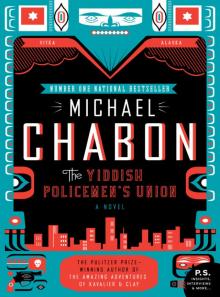Michael Chabon 

by The Yiddish Policemen's Union
Genre: Other7
Published: 2007
View: 1361
Read OnlineRead Michael Chabon Storyline:
For sixty years Jewish refugees and their descendants have prospered in the Federal District of Sitka, a "temporary" safe haven created in the wake of the Holocaust and the shocking 1948 collapse of the fledgling state of Israel. The Jews of the Sitka District have created their own little world in the Alaskan panhandle, a vibrant and complex frontier city that moves to the music of Yiddish. But now the District is set to revert to Alaskan control, and their dream is coming to an end. Homicide detective Meyer Landsman of the District Police has enough problems without worrying about the upcoming Reversion. His life is a shambles, his marriage a wreck, his career a disaster. And in the cheap hotel where Landsman has washed up, someone has just committed a murder—right under his nose. When he begins to investigate the killing of his neighbor, a former chess prodigy, word comes down from on high that the case is to be dropped immediately, and Landsman finds himself contending with all the powerful forces of faith, obsession, evil, and salvation that are his heritage. At once a gripping whodunit, a love story, and an exploration of the mysteries of exile and redemption, The Yiddish Policemen's Union is a novel only Michael Chabon could have written. From Publishers Weekly[Signature]Reviewed by Jess WalterThey are the "frozen Chosen," two million people living, dying and kvetching in Sitka, Alaska, the temporary homeland established for displaced World War II Jews in Chabon's ambitious and entertaining new novel. It is—deep breath now—a murder-mystery speculative-history Jewish-identity noir chess thriller, so perhaps it's no surprise that, in the back half of the book, the moving parts become unwieldy; Chabon is juggling narrative chainsaws here.The novel begins—the same way that Philip Roth launched The Plot Against America—with a fascinating historical footnote: what if, as Franklin Roosevelt proposed on the eve of World War II, a temporary Jewish settlement had been established on the Alaska panhandle? Roosevelt's plan went nowhere, but Chabon runs the idea into the present, back-loading his tale with a haunting history. Israel failed to get a foothold in the Middle East, and since the Sitka solution was only temporary, Alaskan Jews are about to lose their cold homeland. The book's timeless refrain: "It's a strange time to be a Jew."Into this world arrives Chabon's Chandler-ready hero, Meyer Landsman, a drunken rogue cop who wakes in a flophouse to find that one of his neighbors has been murdered. With his half-Tlingit, half-Jewish partner and his sexy-tough boss, who happens also to be his ex-wife, Landsman investigates a fascinating underworld of Orthodox black-hat gangs and crime-lord rabbis. Chabon's "Alyeska" is an act of fearless imagination, more evidence of the soaring talent of his previous genre-blender, the Pulitzer Prize–winning The Amazing Adventures of Kavalier and Clay.Eventually, however, Chabon's homage to noir feels heavy-handed, with too many scenes of snappy tough-guy banter and too much of the kind of elaborate thriller plotting that requires long explanations and offscreen conspiracies.Chabon can certainly write noir—or whatever else he wants; his recent Sherlock Holmes novel, The Final Solution, was lovely, even if the New York Times Book Review sniffed its surprise that the mystery novel would "appeal to the real writer." Should any other snobs mistake Chabon for anything less than a real writer, this book offers new evidence of his peerless storytelling and style. Characters have skin "as pale as a page of commentary" and rough voices "like an onion rolling in a bucket." It's a solid performance that would have been even better with a little more Yiddish and a little less police. (May)Jess Walter was a finalist for the 2006 National Book Award for The Zero and the winner of the 2006 Edgar Award for best novel for Citizen Vince. Copyright © Reed Business Information, a division of Reed Elsevier Inc. All rights reserved. From Bookmarks MagazineDoes The Yiddish Policemen's Union live up to Michael Chabon's formidable reputation? There is no consensus: some critics called the novel the spiritual heir to the Pulitzer Prize?winning Adventures of Kavalier & Clay (2000); others thought it a disappointing aberration. As in Kavalier & Clay, Chabon explores issues of identity, assimilation, and mass culture, but he also pays homage to the noir detective novel—with mixed results. The New York Times called Landsman "one of the most appealing detective heroes to come along since Sam Spade or Philip Marlowe," while the Pittsburgh Post-Gazette felt that the work "came nowhere close to making the cut of a Raymond Chandler novel." Critics similarly disagreed about the writing, the convoluted plot, the symbolism of the Jewish-Native American conflict, and the controversial use of Yiddish slurs and caricatures. If not a glowing success, The Yiddish Policemen's Union nonetheless illustrates the rare talents and creativity of its author.Copyright © 2004 Phillips & Nelson Media, Inc.Pages of Michael Chabon :